3 Oceania
The Pacific islands countries are not only Japan’s “neighbors” that are bound by the Pacific Ocean, but also have deep historical ties with Japan. Having an enormous Exclusive Economic Zone (EEZ), these countries are the cornerstone of Japan’s maritime transport, and provide important pelagic fishing grounds. Therefore, the stability and prosperity of the Pacific island countries are important to Japan.
Meanwhile, many of the Pacific island countries are relatively new independent states that face the urgent task of becoming economically independent. In addition, they have common problems that are specific to small island countries, such as small economies dependent on primary industries, territories being geographically stretched across the sea, difficulty in access to the international market, and vulnerability to natural hazards. Based on this situation, Japan provides assistance for supporting their self-reliant and sustainable development, as a good partner with the Pacific island countries.
■Japan’s Efforts
In order to achieve political stability and self-reliant economic development in the Pacific island countries, it is crucial to overcome socio-economic vulnerabilities and to provide assistance for the entire region. In addition to promoting cooperation with the Pacific Islands Forum (PIF) (Note 6), a framework for regional cooperation composed of the Pacific island countries, Japan has been hosting the Pacific Islands Leaders Meeting (PALM), a summit meeting between Japan and the Pacific island countries every three years since 1997. Furthermore, the Ministerial Interim Meeting has been held every three years since 2010 midway between the PALMs.
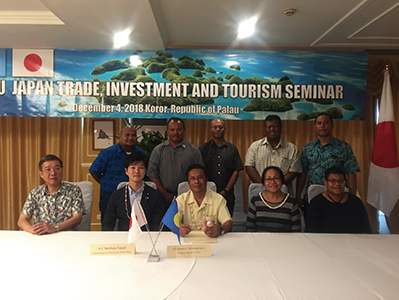
Parliamentary Vice-Minister for Foreign Affairs Norikazu Suzuki meeting with President Remengesau in Palau in December 2018
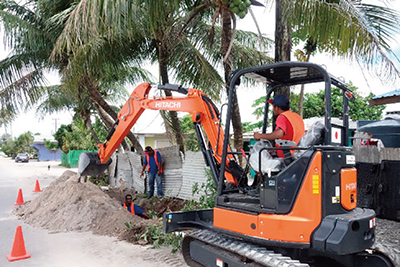
A compact excavator, procured through the Grant Assistance for Grass-Roots Human Security Project, being used to excavate soil for the installation of water pipes by the roadside in Majuro, the capital of the Marshall Islands (Photo: Chizuru Seki)
In May 2018, the Eighth Pacific Islands Leaders Meeting (PALM8) was held in Iwaki City, Fukushima Prefecture. At the Meeting, based on the three pillars of I. Sustainable Ocean Based on the Rule of Law, II. Strengthening the Basis for Resilient and Sustainable Development, and III. Connecting Pacific Citizens, and taking into account the achievements to date, Japan announced the steady implementation of development assistance as before, as well as cooperation and support policies with a focus on further strengthening human resource development and people-to-people exchanges (5,000 people in three years), which serve as the foundation for growth and prosperity.
Based on this assistance package announced at PALM8, Japan is implementing bilateral cooperation, including the development of basic infrastructure such as ports and airports, along with technical cooperation spread across several countries. For the first pillar of PALM8, “Sustainable Ocean Based on the Rule of Law,” Japan conducted training on the deterrence of illegal, unreported, and unregulated (IUU) fishing for officials in charge from the Pacific Islands (See “Project Introduction” for details). As for the second pillar of “Strengthening the Basis for Resilient and Sustainable Development,” Japan is promoting the mainstreaming of disaster risk reduction by providing comprehensive assistance to build disaster-resilient societies in the Pacific island countries. Such assistance includes the training of meteorological agency personnel of each country and developing appropriate evacuation systems for the residents, drawing on Japan’s expertise and experience. Japan is also engaged in efforts to strengthen human resources and systems related to the waste management of Pacific island countries.
Furthermore, to support the Pacific island countries in addressing issues related to climate change, Japan collaborates with the Secretariat of the Pacific Regional Environment Programme (SPREP), a regional international organization based in Samoa, to develop human resources in the area of countermeasures against climate change in each country. With regard to the third pillar of “Connecting Pacific Citizens,” Japan provides support for master’s education programs in Japanese graduate schools, as well as internship programs in Japanese ministries and agencies, for young government officials who will shoulder the future of the Pacific island countries.
●12 Pacific Island Countries*1
Policies and Countermeasures against Illegal, Unreported and Unregulated (IUU) Fishing
Country-focused Training (November– December 2018)
In Oceania, which has an extensive exclusive economic zone (EEZ), abundant marine resources support the livelihoods of local people. In recent years, however, Illegal, Unreported and Unregulated (IUU) fishing has caused severe problems, including threats to the sustainability of limited marine resources, and economic losses. For example, some reports that IUU fishing of tuna reaches the scale of approximately 70 billion yen annually in Oceania.*2
From November to December 2018, Japan held a country-focused training titled “Policies and Countermeasures against Illegal, Unreported and Unregulated (IUU) Fishing,” for the 12 Pacific Island Countries (Papua New Guinea, Fiji, Tonga, Vanuatu, Samoa, Solomon, Marshall, Micronesia, Palau, Kiribati, Tuvalu and Nauru), as a supporting measure regarding IUU fishing in Oceania. Twelve individuals responsible for IUU fishing countermeasures from those 12 countries participated in the training. They gained a deeper understanding of the importance of cooperation between the relevant ministries and agencies, and IUU fishing countermeasures in Japan, such as the treatment of cases of fishing-related law violation, through lectures by the Fisheries Agency and the Japan Coast Guard, as well as on-site observation. This also facilitated closer cooperation between the ministries and agencies of Japan and the Oceanian countries.
In addition, experts in IUU countermeasures from the U.S., which promote the “Free and Open Indo-Pacific,” together with Japan, came to Japan to give lectures. After their training, the trainees stated that they hope to apply what they learned in Japan, to strengthen IUU countermeasures back home.
Japan will continue to provide support in strengthening IUU fishing countermeasures in Oceania.
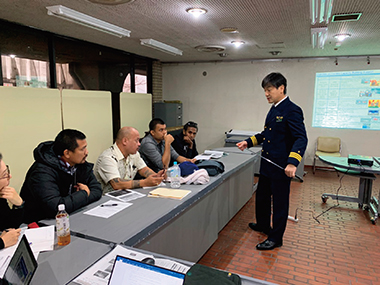
Trainees listening to the explanation of IUU fishing countermeasures by an official of the Japan Coast Guard (Photo: JICA)
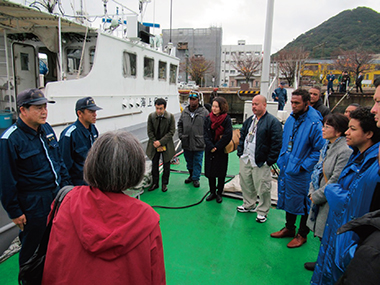
Trainees listening to the explanation about a Japan Coast Guard patrol vessel (Photo: JICA)
*1 Papua New Guinea, Fiji, Tonga, Vanuatu, Samoa, Solomon, Marshall, Micronesia, Palau, Kiribati, Tuvalu, Nauru
*2 According to a report by the Pacific Islands Forum Fisheries Agency (FFA).
![[Japan’s international cooperation policy] Priority issues in the Oceania Region](imgs/p086_1.jpg)
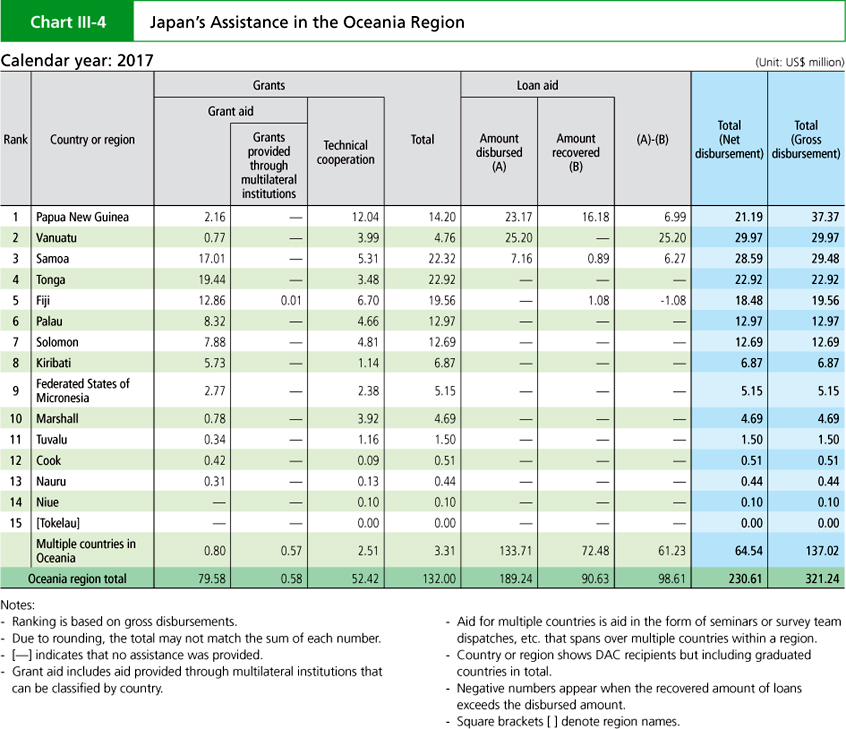
- Note 6: PIF member countries and regions: Australia, Kiribati, Cook, Samoa, Solomon, Tuvalu, Tonga, Nauru, New Zealand, Niue, Vanuatu, Papua New Guinea, Palau, Fiji, Marshall, Federated States of Micronesia, French Polynesia, and New Caledonia
